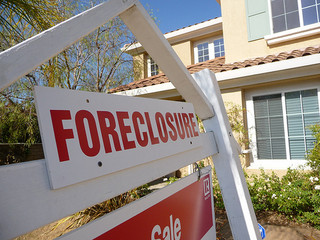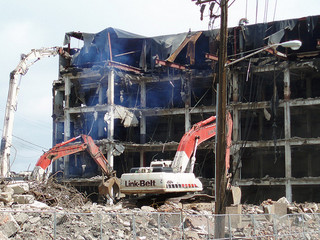A deed of trust represents security for the loan. It has several parties- a) the trustor, who is the borrower and owner of record for the real property that is security for the loan; b) the beneficiary, who is the lender whose debt is secured by the deed of trust; and c) the trustee, who holds bare legal title only for the purpose of conveying it in the event of a foreclosure. The deed of trust contains a “power of sale,” giving the trustee the ability to foreclose. Once the deed of trust is created and recorded, if there is a default, the beneficiary routinely changes who the trustee is by recording a “substitution of trustee,” putting a new trustee in the job. Homeowners in this situation should consult with a Sacramento and Yolo real estate attorney to determine their rights. In a recent case, the borrower- homeowner who lost their property to foreclosure realized that the original deed of trust did not name a trustee, and sued to set aside the foreclosure sale. The court said no.
 In Shuster vs. BAC Home Loans Servicing LP (formerly known as Countrywide Loan Servicing) Shuster borrowed $670,000 to buy a house in Simi Valley. Mortgage Electronic Registration Systems, Inc. (MERS) was named beneficiary; but there was no trustee named in the document. Shuster ended up in default, MERS recorded a Substitution of Trustee, and the new trustee foreclosed. Shuster brought this action.
In Shuster vs. BAC Home Loans Servicing LP (formerly known as Countrywide Loan Servicing) Shuster borrowed $670,000 to buy a house in Simi Valley. Mortgage Electronic Registration Systems, Inc. (MERS) was named beneficiary; but there was no trustee named in the document. Shuster ended up in default, MERS recorded a Substitution of Trustee, and the new trustee foreclosed. Shuster brought this action.
Shuster argued that, with no trustee, there was no one to receive the conveyance of bare legal title. This transforms the deed of trust into a standard mortgage. Under California law, a mortgage that is not standard deed of trust (with a power of sale) may only be foreclosed by judicial foreclosure – filing a lawsuit for foreclosure and obtaining a court order.
 California Real Estate Lawyers Blog
California Real Estate Lawyers Blog


 1. Original lender holds both first & second, forecloses on first.
1. Original lender holds both first & second, forecloses on first. While the principals were overseas, Chang, the lender, successfully foreclosed the deed of trust and became owner of the 25% interest in the property. To further collect on the balance of the money owed by Mali, the Lender sued her. Mali had CFI assign to her “all of its right, title, interest, and standing to bring suit, to, in, and on, any and all claims and causes of action which it has against Chen…” Mali then filed a cross-complaint against the Lender for wrongful foreclosure & slander of title. However, Mali had to dismiss her claims just before trial, because CFI’s corporate status had been suspended, and thus had no power to pursue legal actions- as a result, the assignment of claims to Mali was void. Mali assigned the claims back to CFI.
While the principals were overseas, Chang, the lender, successfully foreclosed the deed of trust and became owner of the 25% interest in the property. To further collect on the balance of the money owed by Mali, the Lender sued her. Mali had CFI assign to her “all of its right, title, interest, and standing to bring suit, to, in, and on, any and all claims and causes of action which it has against Chen…” Mali then filed a cross-complaint against the Lender for wrongful foreclosure & slander of title. However, Mali had to dismiss her claims just before trial, because CFI’s corporate status had been suspended, and thus had no power to pursue legal actions- as a result, the assignment of claims to Mali was void. Mali assigned the claims back to CFI. n La Jolla Group II v. Bruce (5th Dist. F061829; 211 CalApp 4th 461), the Baquiran’s owned their home for 16 years. In 2003 a notice of default & note of trustee’s sale were recorded for default on a second deed of trust secured by the residence. However, the Baquirans had no knowledge of a second deed of trust. The foreclosure sale occurred, and La Jolla Group bought the property at the trustee’s sale.
n La Jolla Group II v. Bruce (5th Dist. F061829; 211 CalApp 4th 461), the Baquiran’s owned their home for 16 years. In 2003 a notice of default & note of trustee’s sale were recorded for default on a second deed of trust secured by the residence. However, the Baquirans had no knowledge of a second deed of trust. The foreclosure sale occurred, and La Jolla Group bought the property at the trustee’s sale. In
In  In
In  In
In The borrower in
The borrower in  Title companies often prepare complicated documents, such as deeds of trust, grant deeds, an promissory notes to accommodate closing escrows, which results in their fees. There can be mistakes that vary in seriousness, and sometimes the only solution is to have the Court order a document re-formed. A recent decision points out the problems that can arise when a property was sold for $7.2 million dollars, and the seller did not have an
Title companies often prepare complicated documents, such as deeds of trust, grant deeds, an promissory notes to accommodate closing escrows, which results in their fees. There can be mistakes that vary in seriousness, and sometimes the only solution is to have the Court order a document re-formed. A recent decision points out the problems that can arise when a property was sold for $7.2 million dollars, and the seller did not have an  In historical terms, the California deed of trust is a recent development. Originally parties used a “mortgage” in which the property was conveyed by the buyer to the lender, subject to payment of the debt. Prior to payment of the debt, the lender was entitled to possession of the property. Use of the deed of trust with power of sale was developed to get around some of the restrictions of the mortgage and the required judicial foreclosure, a time consuming lawsuit. The property was conveyed to the buyer, who kept the right to possession, but he then conveys “nominal title” to the trustee, who, on instruction from the lender, could hold a foreclosure (by trustee’s sale) without court involvement. Borrowers and lenders concerned with the difference should contact an
In historical terms, the California deed of trust is a recent development. Originally parties used a “mortgage” in which the property was conveyed by the buyer to the lender, subject to payment of the debt. Prior to payment of the debt, the lender was entitled to possession of the property. Use of the deed of trust with power of sale was developed to get around some of the restrictions of the mortgage and the required judicial foreclosure, a time consuming lawsuit. The property was conveyed to the buyer, who kept the right to possession, but he then conveys “nominal title” to the trustee, who, on instruction from the lender, could hold a foreclosure (by trustee’s sale) without court involvement. Borrowers and lenders concerned with the difference should contact an